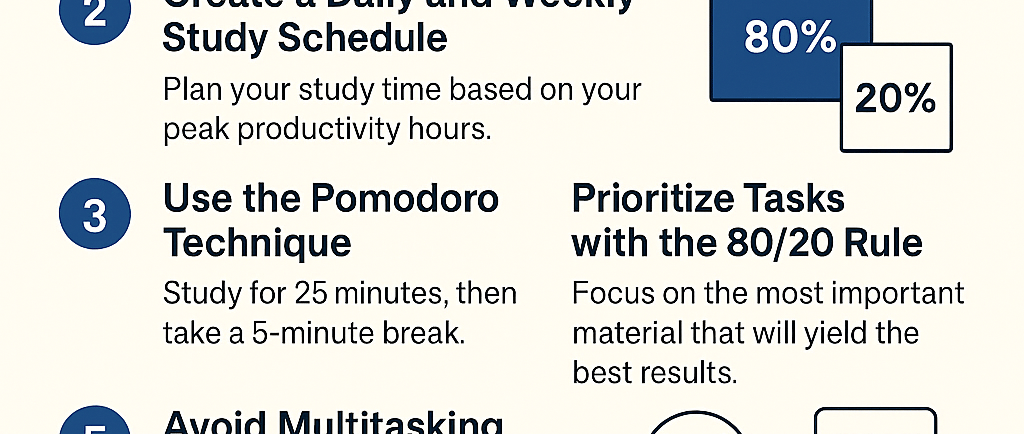Mastering Time Management: Top Strategies for Exam Success


Time is one of the most precious resources for students preparing for exams, especially for competitive ones like NEET, JEE, or board exams. Efficient time management is not just about studying harder but studying smarter. It ensures that your efforts lead to maximum results without burnout. Here are some tried-and-tested time management strategies to help you succeed in your exams.
1.Set Clear, Achievable Goals
The first step in managing your time effectively is setting realistic and specific goals. Break down your syllabus into subjects, then into topics, and assign deadlines for each. Use SMART goals — Specific, Measurable, Achievable, Relevant, and Time-bound — to stay focused and track your progress.
2.Create a Daily and Weekly Study Schedule
Prepare a detailed timetable based on your peak productivity hours. Allocate time slots for each subject, revision, and practice. Always include buffer time for unexpected interruptions. For example:
Morning: Concept learning (your freshest hours)
Afternoon: Practice questions/mock tests
Evening: Revision or lighter subjects
Stick to the schedule as much as possible and review it weekly to make adjustments.
3.Use the Pomodoro Technique
The Pomodoro Technique is a popular time management method:
Study for 25 minutes (1 Pomodoro)
Take a 5-minute break
After 4 Pomodoros, take a longer break (15–30 minutes)
This technique helps maintain focus and prevents mental fatigue, especially during long study sessions.
4.Prioritize Tasks with the 80/20 Rule
Also known as the Pareto Principle, it suggests that 80% of your results come from 20% of your efforts. Identify high-yield topics or chapters — especially those frequently asked in exams — and give them more attention. Don’t waste time over-perfecting less relevant content.
5.Avoid Multitasking
Focus on one task at a time. Trying to study multiple subjects or switch between tasks quickly reduces concentration and retention. Use full focus during study time, and eliminate distractions like mobile phones, social media, or loud environments.
6.Practice with Time-Bound Tests
Simulate the exam environment at home. Take mock tests with a timer, just like in the real exam. This trains your brain to work efficiently under pressure and improves your speed and accuracy.
7.Get Enough Sleep and Rest
Your brain needs rest to absorb and retain information. Ensure you sleep at least 6–8 hours a night, especially during preparation time. Sleep-deprived study sessions lead to poor focus, stress, and memory loss.
8.Reflect and Revise Regularly
At the end of each day or week, review what you’ve studied. Track your goals. Were you productive? What needs more revision? Regular self-checks help you stay accountable and make improvements before it’s too late.
Conclusion
Time management is a skill that separates toppers from the rest. With planning, discipline, and the right strategies, you can conquer your syllabus efficiently and walk into the exam hall with confidence. Remember: it’s not about how much you study, but how well you use your time.
